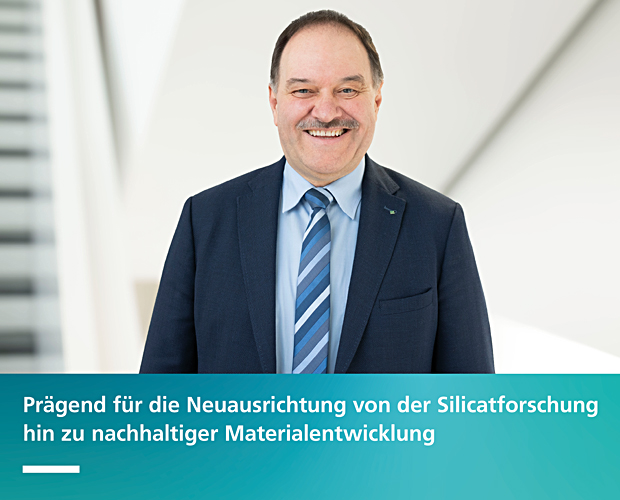Institute Director Prof. Dr. Gerhard Sextl retires
On 1st April 2024, Prof. Dr. Gerhard Sextl retired as Institute Director at the Fraunhofer Institute for Silicate Research ISC in Würzburg. Since February 2006, he has actively shaped the development of the Fraunhofer ISC and redefined its course. Over the past 18 years, the Institute has grown considerably under his leadership and has successfully established new fields of research and technologies related to the core competence of chemically based materials development.
Prof. Dr. Gerhard Sextl is highly regarded both nationally and internationally as a renowned scientist in his field. His impressive career is characterised by outstanding achievements in materials research, the development of innovative inorganic materials, electromobility and health research.
After completing his studies and doctorate, Prof. Sextl gained valuable experience in various private companies in Germany and abroad from 1988. At the same time, he taught at the Leibniz University of Hanover from 1998. In 2006, he was appointed to the Julius Maximilians University of Würzburg, where he held the chair of “Chemical Technology of Materials Synthesis” and simultaneously took over the management of the Fraunhofer Institute for Silicate Research ISC in Würzburg. Under his leadership, the Institute has developed into a leading centre for materials research in the field of energy and resource efficiency in Germany. The Würzburg Institute is also home to the Fraunhofer Research and Development Centre for Electromobility Bavaria and the Fraunhofer Project Group for Materials Recycling and Resource Strategies IWKS, which Prof. Sextl founded in Alzenau in 2011. The project group moved to neighbouring Hanau in 2012, and the IWKS has continued as an independent Fraunhofer institution since 2019.
Prof. Sextl’s strategic orientation has made battery research a central research area at Fraunhofer ISC and has played a key role in shifting the focus of European politics and industry towards its own battery cell production. His involvement in the “National Platform Future of Mobility” has advanced the topics of value creation, batteries and battery recycling.
One of Prof. Sextl’s particular concerns was to support the traditional ceramics industry in north-east Bavaria. Through his involvement in setting up the Fraunhofer Centre for High-Temperature Lightweight Construction in Bayreuth, he is promoting structural change in the industry and opening up new technical fields of application for special ceramics.
Since 2015, Prof. Sextl has intensified the research activities of the ISC in the field of health through close cooperation with Prof. Dr. Heike Walles, who established a Fraunhofer IGB project group and a chair at the Julius Maximilian University of Würzburg on the subject of regenerative therapies. In 2017, the project group was transferred to the Fraunhofer ISC as the Fraunhofer Translational Centre for Regenerative Therapies (TLC-RT).
In addition to his academic and institute management activities, Prof. Sextl is involved in various networks and committees. In 1996, he became a member of the board, in 2010 chair of the specialist group “Applied Inorganic Chemistry” of the “Dechema Society for Chemical Engineering and Biotechnology e.V.” and in 2011, chair of the specialist group “Chemical Reaction Engineering”. As an honorary board member of the “Industrieverband Materials Valley e.V.”, he is committed to the sustainable use of resources in Germany and also supports scientific institutions as an expert.
Through his dual role as University lecturer and Institute director, Prof. Sextl combined excellent scientific and application-orientated skills. His work has made important contributions to tackling key social challenges in the areas of resources, energy and health. In 2021, he was awarded the Cross of the Order of Merit of the Federal Republic of Germany for his commitment.
Today, the Fraunhofer ISC stands for first-class materials science expertise with many years of experience in materials processing, industrial application and the large-scale upscaling of production and process technologies as well as in materials analysis and characterisation in the fields of
- Materials Chemistry,
- Centre for Applied Analytics,
- Fraunhofer R&D Centre for Electromobility (FZEB),
- Centre for Smart Materials and Adaptive Systems
at the parent institute in Würzburg at Neunerplatz,
- Centre for Device Development,
- International Centre for Cultural Heritage Protection and Conservation Research,
at the Bronnbach Monastery,
- Translational Centre for Regenerative Therapies (TLZ-RT) at the Würzburg Röntgenring and
- Centre for High-Temperature Materials (HTL) in Bayreuth.
Until the conclusion of the ongoing appointment procedure for the chair at the University of Würzburg and the Institute management of the Fraunhofer ISC, the Deputy Institute Directors Dr. Thomas Hofmann, Prof. Dr. Karl Mandel and Prof. Dr. Friedrich Raether will manage the business on an interim basis.
The employees of the Fraunhofer ISC would like to thank their Institute Director for 18 years of prudent leadership and the great commitment with which he has taken care of the development of the organisation and the research topics and wish him all the best for the future.
Last modified:
